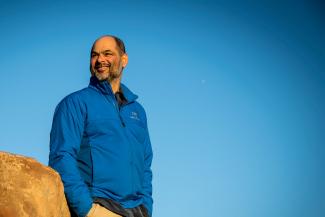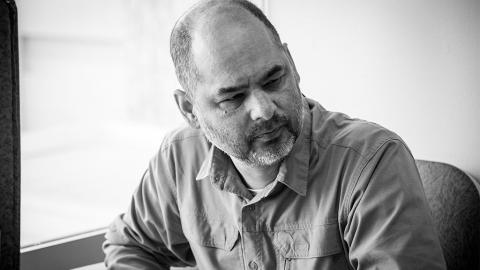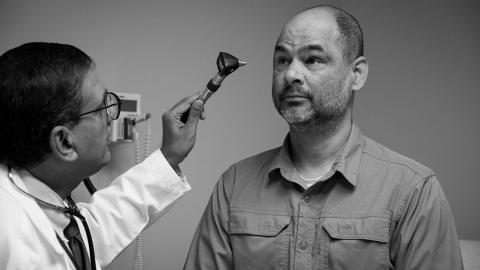
Sunil Dutta, a writer and a poet has found that accepting death, being curious rather than fearful helps in dealing with the diagnosis and treatment of lung cancer. He finds solace in Ghalib and Zauk.
Sunil Dutta stared at a scan of his lungs. Hundreds of tiny nodules melded together into a snow-white mass — each pockmark occupying what was once healthy tissue. A normal lung scan is mostly dark grey hues, with a few white spots indicating abnormalities.
This was something entirely different.
“The scan was so full of white dots it appeared there was no room left inside my lungs,” said Dutta, 54, a writer and poet diagnosed with lung cancer in 2016. “It was diffuse light coming out of brighter white. I thought, ‘How am I breathing?’”
There were “innumerable” cancerous nodules in his chest, according to the description in Dutta’s medical record. So many, in fact, that during an earlier X-ray technicians had stopped trying to count them.
For several minutes, the pulmonologist interpreting his scan spoke elliptically about Dutta’s condition, avoiding specifics.
“I had to ask him, ‘Hey doctor, is this metastatic cancer? Because that’s how it looks,’” said Dutta, who also has a science background. “He seemed shocked, but he did tell me they could keep me comfortable, so I guess he didn’t have much hope.”
MUTATION
Dutta had been coughing — a ragged, nagging cough he first assumed was a bad cold. But after several weeks, the cough still grated and he started to feel weak. Normally he could run three to five miles. One morning he struggled to make it 100 yards.
“I realized something was wrong,” he said. “Suddenly I started putting things together. I thought, ‘This cough hasn’t gone away for two months, maybe more.’ I was having shortness of breath. Then I realized I’d lost some weight.”
It was a whirlwind considering he had always been healthy and never smoked.
A biopsy performed later revealed the first glimmer of positive news: Dutta’s cancer was driven by a genetic mutation called EGFR, epidermal growth factor receptor. EGFR is a protein on cell surfaces that regulates growth and division. When the receptor is abnormal, as in Dutta’s case, cells can grow unchecked.
“The doctor was hoping I would have that mutation because the lungs were really bad,” he said.
For lung cancer patients, an actionable mutation is good news. It means a drug may be available to target it — that there is hope.

Dutta is calm and curious despite the twists and turns of lung cancer.
BARELY BREATHING
There was a clinical trial for a drug targeting the EGFR receptor, but Dutta would have to undergo weeks of testing before he could enroll. While he waited, his lung function deteriorated.
Dutta was diagnosed with Stage 4 lung cancer (the cancer had migrated to his bones) on June 10. By the evening of July 3, he was bedridden.
“His breathing was so bad that night,” said his wife, Wes Dutta. “He was really, really out of it. It was scary.”
But Dutta was unafraid.
“I was lying in bed, on oxygen, and an interesting thought crossed my mind,” said Dutta. “I thought, ‘Oh, so this is how someone dies? You’re breathing and in pain. That’s nothing special.’”
Lately, particularly since his diagnosis, curiosity — rather than fear — about death is a common thought process for Dutta.
“Many times, I am watching — watching myself as someone undergoing something,” he explains. “I’m curious rather than fearful about whatever is happening. I think having that attitude doesn’t bring anger or frustrations.”
So, Dutta was calm and curious as he accepted what he thought was his fate.
While his lung function flagged, a good friend who had been treated for breast cancer at City of Hope began an urgent correspondence with her oncologist.
She explained Dutta’s condition and asked for help. Her physician connected her with Ravi Salgia, M.D., Ph.D., an oncologist and leading lung cancer expert.
“My friend called and said, ‘The doctors want you to go to the hospital right away,'” said Dutta. “I was in so much pain I said, ‘Let’s talk about it later.’
“By the time I woke up the next morning, I thought, ‘I can’t take this anymore. I will go to the hospital."
TUMOR REDUCED BY HALF
It was the 4th of July 2016 when Dutta arrived at City of Hope. It was quiet. He was one of the only patients admitted that day.
“I remember distinctly that Sunil was incredibly short of breath and having a hard time speaking,” said Salgia, the Arthur & Rosalie Kaplan Endowed Chair in Medical Oncology and chair of the Department of Medical Oncology & Therapeutics Research. “We quickly realized that we couldn’t wait to start thinking about his lung cancer, and we really couldn’t wait to start treating his lung cancer.”
Dutta was hooked up to oxygen while his treatment team determined which approach to take for his disease. Salgia and his team soon confirmed EGFR was driving the cancer, and Dutta was given an EGFR-inhibiting drug called erlotinib.
Within a few days he felt better, and had regained enough strength to go home.
A follow-up scan performed soon after discharge was a marked contrast to the one he’d had months earlier. Instead of lungs riddled with white spots, there were several large pockets of grey.
“He responded beautifully to the therapy,” said Salgia.
“It was a great improvement,” said Dutta. “The nodules had gone down in number and the tumor had reduced to maybe half.”
For several months, Dutta got back to more and more vigorous activity. He worked on a book proposal. He visited with friends. He read poetry and listened to music. He was in good spirits.
But by June 2017, his breathing — again — began to falter.
“My indicator, I know now, is how I breathe,” said Dutta. “And I thought, ‘I cannot breathe well. I’m running short of air.’”
A few days later, a scan showed the cancer was growing again. It appeared the cancer cells that had been tamed by erlotinib had now outwitted the drug, and were multiplying furiously. Dutta resigned himself to three or four more months of life.
“Cancer came really aggressively, all the gains that were made were gone,” said Dutta. “I thought, ‘OK, I’ve got a few more months of happy, peaceful existence.’”
Dutta had decided that undergoing more grueling courses of chemotherapy and radiation was not worth a few extra months of life. But Salgia said he still had options. They could perform tests to get at the true nature of the cancer; and find out if these new tumor cells expressed an altered mutation that could be targeted.

Dutta during an appointment with Salgia
“Lung cancer is no longer just lung cancer in my mind,” said Salgia. “Lung cancer is really many diseases that arise in the lung, so it’s important for us, as we consider therapies, to dive deeper.”
Salgia suggested a sensitive, less invasive test called a liquid biopsy. Rather than using a needle, it involves extracting a blood sample to detect markers and mutations expressed by tumors.
Dutta was tested almost a year to the day after his initial diagnosis. While he awaited results of the biopsy, the same sequence of events that occurred the year before, happened again.
Again, he was in pain. Again, he was admitted to the hospital. And again, according to the test results, Dutta had a targetable mutation.
“I literally had my third life,” he said with a smile.
STABLE AND SHRINKING
In a nondescript exam room at City of Hope in early February 2018, Salgia rests a stethoscope on Dutta’s chest.
“Take a deep breath,” says Salgia. Dutta lets out a few coughs before his breathing returns to normal.
“Is your breathing OK?” asks Salgia.
“Breathing is OK,” replies Dutta.
The call and response of a typical doctor’s appointment continues with Salgia’s questions about nausea, fatigue, eating — followed by Dutta answering that, “All is well.” Then, as has become typical for the two men, the talk turns to politics and poetry.
It is a typical exchange. Even as he struggled to breathe, on his first visit with Salgia, the two men bonded over a Persian poetry couplet Dutta quoted from memory: "I cut off my ties with desire, suffering of existence became easier to bear, I gave up the urge to spread my wings, my cage transformed into a garden."
Today, they talk about progress on a book Dutta is writing.
“Book is written?” asks Salgia.
“Uh … it’s stuck in the middle,” says Dutta.
Eventually, Salgia pivots the conversation back to results of a recent CT scan.
“You have no evidence of disease in the brain, which is great,” he says. “And the CT of the chest looks fantastic.”
He swivels in his chair to face a screen displaying Dutta’s latest lung scan. Salgia points: “This is your left lung and this is your right lung.” Gesturing toward the right lung he adds, “This is the tumor and it hasn’t really changed much.”
Salgia then points to an image of the right lung.
“On the right side there’s still the fluffiness,” he says, referring to evidence of dormant tumors in Dutta’s lung. “You see that fluffiness? That’s what we’re going to be watching.”
Dutta, who has been listening intently, asks of his scan: “Is it stable or is there some reduction …?”
“Stable and shrinking,” replies Salgia. “I’m happy.”

Dutta and his wife, Wes
'MY EXPERIENCE IS GOING TO BE ...'
लाई हयात आयी कज़ा ले चली चले
अपनी ख़ुशी न आये, न अपनी ख़ुशी चले
इब्राहिम ज़ौक़
“‘Life brought us, so we came,’” said Dutta, sitting on a pillow in the dim light of his living room, balancing a warm cup of chai tea on his palm. “‘Death takes us, we go.’”
The lines of poetry he quotes are in Urdu — a couplet by a poet named Ibrahim Zauq. Dutta is prone to quoting Indian and Persian poets to help explain his thoughts about death. He gives his interpretation of the couplet: “We don’t plan to be born and we don’t plan to be dead, but it happens.”
For Dutta, a sentiment in most societies — and what drives the behaviors and reactions of most people in them — is fear of death. He believes that accepting death simplifies life. He quotes one of his favorite poets, Ghalib: “‘Our death day is already decided … why do people complain they cannot sleep?’”
मौत का एक दिन मुअय्यन है
नींद क्यों रात भर नहीं आती
मिर्ज़ा ग़ालिब
“It takes away the hypocrisy of human behavior and existence,” said Dutta, explaining the couplet. “This is all, you cannot change it, so why do you fret over meaningless things?”
It is an attitude that, for most, would spark discomfort. But for Dutta, it has made life, and more recently, cancer, a thing to view dispassionately.
“My body’s DNA is hiding all these secrets,” said Dutta, with a knowing look. “Until we know what kick-starts them there’s no treatment, that’s the reality.
“But I don’t pay attention to that because my experience is going to be what my experience is going to be.”
Republished originally from City of Hope with permission from Sunil Dutta
With deep regret we wish to inform our readers that Sunil Dutta passed away on 21st May 2019. You can reach the legacy page here.






